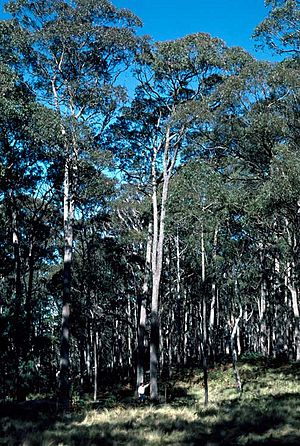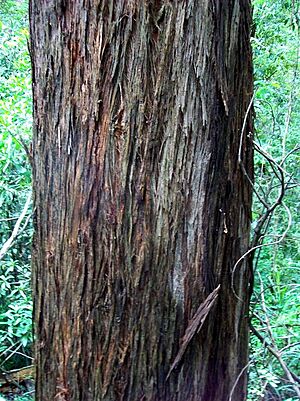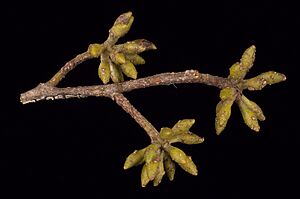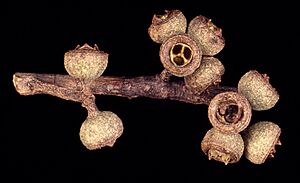Silver top stringybark facts for kids
Quick facts for kids Silver top stringybark |
|
|---|---|
 |
|
| Silver top stringybark on the Liverpool Range | |
| Scientific classification | |
| Genus: |
Eucalyptus
|
| Species: |
laevopinea
|
The silver top stringybark (scientific name: Eucalyptus laevopinea) is a special tree found only in eastern Australia. It has rough, stringy bark that looks grey. Its leaves are shiny green and shaped like a spear. This tree also has white flowers and round, woody fruits.
Contents
What the Silver Top Stringybark Looks Like
The silver top stringybark is a tall tree. It can grow up to 40 meters (about 130 feet) high. It has rough, thick, grey bark on its trunk and big branches. Higher up, the bark is smooth and whitish.
Young plants have leaves shaped like spears or eggs. These leaves are lighter on the bottom. They can be from 30 to 120 millimeters long (about 1 to 4.7 inches).
Adult leaves are shiny green on both sides. They are also shaped like spears, but sometimes a bit curved. These leaves are usually 70 to 200 millimeters long (about 2.7 to 7.8 inches).
Flowers and Fruit
The flowers of this tree are white. They grow in groups of seven, nine, or eleven. Each group of flowers grows on a short stem.
The flower buds are oval-shaped. They are about 5 to 7 millimeters long. The top part of the bud can be rounded or pointed.
The silver top stringybark flowers at different times of the year. It can flower between January and April, or from July to September.
After the flowers, the tree grows woody fruits. These fruits are shaped like a half-sphere or a flattened ball. They are about 4 to 9 millimeters long and 7 to 15 millimeters wide.
Where the Silver Top Stringybark Grows
You can find the silver top stringybark in eastern Australia. It grows in the hilly areas of New South Wales, near places like Rylstone. It also grows in southern Queensland, around Warwick and Stanthorpe. This tree likes to grow in open forests.
About Its Name
The scientific name for this tree is Eucalyptus laevopinea. A scientist named Richard Thomas Baker first described it in 1898.
The name laevopinea comes from two words. "Laevo-" means 'left' and "pinene" refers to a special oil found in the tree. This name describes a certain type of oil found in the tree's leaves.




